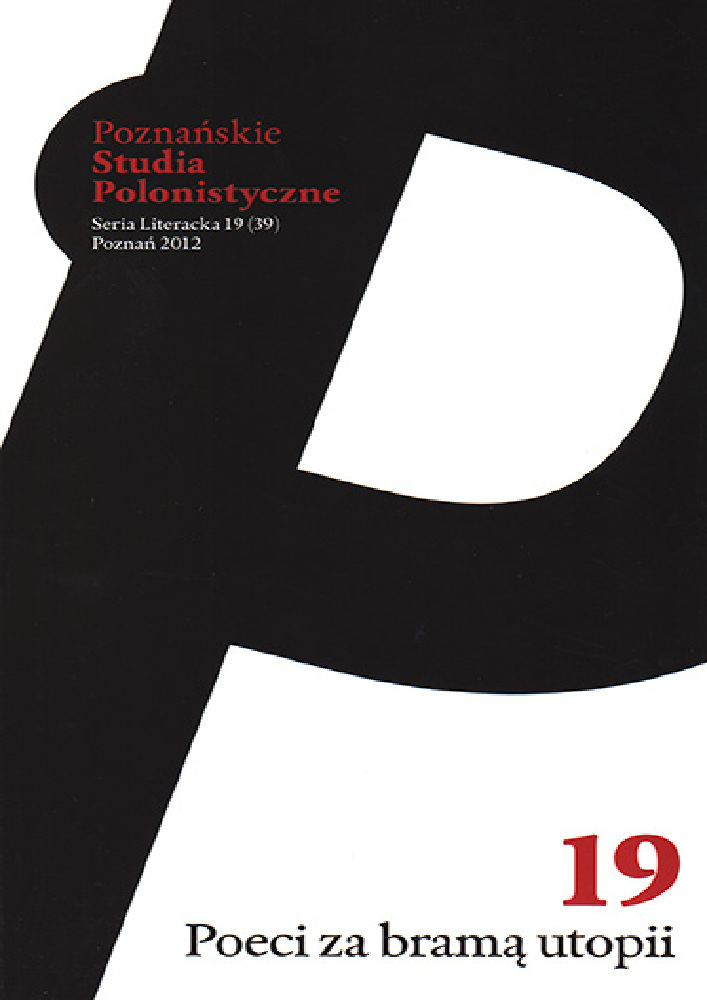Abstract
The present article attempts to interpret the poem Wyrok [The Verdict] written by Rafał Wojaczek. The author tries to reveal the rules of the game in the play with psychoanalysis that are set in motion in the poem by the introduction of the Freudian signature to the text. Citing the Oedipus complex as one of the “representative” mechanisms for the development of the phenomenon of unawareness, he proceeds to prove that the theory of psychoanalysis as the interpretative context can function on the principle of the paradox, i.e. the stronger the denial of it within the subject, the more important it becomes for the understanding of the work. In this way, Wojaczek, by making the poem heretically sealed, opens it up to interpretation and, eventually, implies that its sense goes beyond any explanation (negation of psychoanalysis as an interpretative method). This last statement makes the basis for a formulation of further assumptions on the psychical structure of the subject (conscious unawareness and unconscious awareness), as well as the relations between the author, the subject and the lyrical protagonist where the author, after exceeding the limits of the poem, splits himself into two instances: textual representation (that of the father) and the lyrical “I” that is the irrevocable verdict condemning the poet to making them fit into language and grammar. An attempt, then, at salvation and a coupling of the body (blood) with the lingering word turns out, however, to be deadly, a carrying out of the verdict.
References
Bereś S., Batorowicz-Wołowiec K., Wojaczek wielokrotny. Wspomnienia, relacje, świadectwa, Wrocław 2008.
Kafka F., Dzienniki 1910–1923, t. 2, przeł. Jan Werter, Londyn 1993.
Kafka F., Kolonia karna, w: idem, Wyrok, przeł. J. Kydryński, Warszawa 1975.
Karpowicz T., Sezon na ziemi, w: Który jest. Rafał Wojaczek w oczach przyjaciół, krytyków i badaczy, red. R. Cudak i M. Melecki, Katowice 2001.
Kierc B., Nota edytorska, w: R. Wojaczek, Utwory zebrane, Wrocław 1976.
Kierc B., Rafał Wojaczek. Prawdziwe życie bohatera, Warszawa 2007.
Kierc B., „Znam go, nazywa się Rafał Wojaczek”, w: Który jest. Rafał Wojaczek w oczach przyjaciół, krytyków i badaczy, red. R. Cudak i M. Melecki, Katowice 2001.
Lewandowski T., Okolice innej bajki, „Poezja” 1988, nr 7.
Szczawiński M.M., Rafał Wojaczek, który był, Katowice 1999.
Wojaczek R., Dziennik, w: idem, Utwory zebrane, Wrocław 1976.
Wojaczek R., Pornografia w siedmiu klatkach, w: idem, Utwory zebrane, Wrocław 1976.
Wojaczek R., Wiem kto to jest, „Poezja” 1965, nr 1.
Wojaczek R., Wiersze zebrane, oprac. B. Kierc, Wrocław 2005.
License
Authors
Authors of texts accepted for publication in „Poznańskie Studia Polonistyczne. Seria Literacka” are required to complete, sign and return to the editor's office the Agreement for granting a royalty-free license to works with a commitment to grant a CC sub-license.
Under the agreement, the authors of texts published in „Poznańskie Studia Polonistyczne. Seria Literacka” grant the Adam Mickiewicz University in Poznań a non-exclusive, royalty-free license and authorize the use of Attribution-NoDerivatives 4.0 International (CC BY-ND 4.0)Creative Commons sub-license.
The authors retain the right to continue the free disposal of the work.
Users
Interested Internet users are entitled to use works published in „Poznańskie Studia Polonistyczne. Seria Literacka” since 2016, for non-commercial purposes only, under the following conditions:
- attribution - obligation to provide, together with the distributed work, information about the authorship, title, source (link to the original work, DOI) and the license itself.
- no derivatives - the work must be preserved in its original form, without the author's consent it is not possible to distribute the modified work, such as translations, publications, etc.
Copyrights are reserved for all texts published before 2016.
Miscellaneous
Adam Mickiewicz University in Poznań retains the right to magazines as a whole (layout, graphic form, title, cover design, logo etc.).
